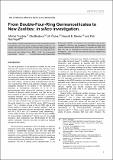From double-four-ring germanosilicates to new zeolites : in silico investigation
Abstract
To date, the majority of zeolites have been prepared by the solvothermal route using organic structure directing agents. Two new zeolites with structural codes PCR and OKO were recently prepared from UTL germanosilicate by removal of the double-four ring (D4R) connecting the dense two-dimensional layers [Nature Chem. 2013, 5, 628]. The corresponding experimental protocol, Assembly-Disassembly-Organization-Reassembly (ADOR), is explored in this contribution with an in silico investigation. The structure and properties of hypothetical zeolites that could be obtained from zeolites with IWW, IWV, IWR, ITR, and ITH topologies using the ADOR protocol are reported based on a computational investigation. A total of 20 new structures are presented together with their characteristics.
Citation
Trachta , M , Bludský , O , Čejka , J , Morris , R E & Nachtigall , P 2014 , ' From double-four-ring germanosilicates to new zeolites : in silico investigation ' , ChemPhysChem , vol. 15 , no. 14 , pp. 2972-2976 . https://doi.org/10.1002/cphc.201402358
Publication
ChemPhysChem
Status
Peer reviewed
ISSN
1439-4235Type
Journal article
Rights
This is the peer reviewed version of the following article: Trachta, M., Bludský, O., Čejka, J., Morris, R. E., & Nachtigall, P. (2014). From double-four-ring germanosilicates to new zeolites: in silico investigation. ChemPhysChem, 15(14), 2972-6, which has been published in final form at http://dx.doi.org/10.1002/cphc.201402358. This article may be used for non-commercial purposes in accordance With Wiley-VCH Terms and Conditions for self-archiving
Description
The authors acknowledge financial support from the Grant Agency of the Czech Republic (Center of Excellence—P106/12/G015). R.E.M. thanks the Royal Society for provision of an industry fellowship and the E.P.S.R.C. for funding (EP/K025112/1).Collections
Items in the St Andrews Research Repository are protected by copyright, with all rights reserved, unless otherwise indicated.

